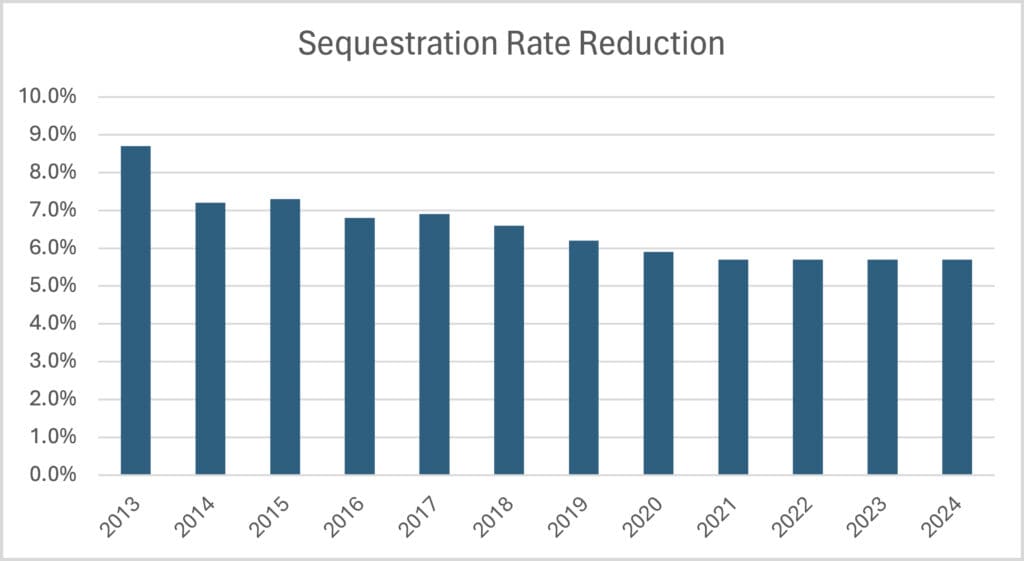Build America Bonds (BABs) were created as part of the 2009 American Recovery and Reinvestment Act (ARRA). BABs are federally taxable municipal bonds issued during 2009 and 2010 for which up to 35% of the borrowing costs are federally subsidized either through payments to the issuer (Direct-Pay BABs) or through payments to bondholders (Tax Credit BABs). The IRS estimates that more than $181 billion of BABs were issued by state and local governments, and Bloomberg data suggests that about $116 billion of BABs were still outstanding as of March 2024.
Direct-Pay BABs often contain Extraordinary Redemption Provisions (ERPs), which are usually triggered by a material adverse change in the subsidy. The exact language varies amongst different bonds with some having precise definitions of what constitutes a material adverse change while others contain more vague verbiage. For the latter category, it has been widely viewed that the federal subsidy cuts stemming from the Budget Control Act of 2011, commonly known as sequestration, resulted in a material adverse change to the subsidy and, therefore, triggered the ERP.
Extraordinary redemptions of BABs have occurred each year since sequestration first started in 2013, but the amount called each year has been rather low until recently. There has been a noticeable uptick in BAB redemptions so far in 2024, and some analysts expect many more to be called later this year. Investors may be puzzled as to why issuers are choosing to redeem their BABs now if the ERP was triggered in 2013, and there are several reasons contributing to this trend:
- A court ruling clarifying that sequestration constituted an “extraordinary event.”
- A recent court decision (Indiana Municipal Power Agency v. US) supports the conclusion that federal budget sequestration cuts did in fact result in an extraordinary event that triggered many ERPs. This decision provides the clarity some issuers needed to proceed with redeeming their BABs using the ERP
- Make-Whole call prices have fallen as market rates have increased.
- The price at which a bond may be redeemed is stated in the prospectus for each bond. It can be at par, at a premium, or at a make-whole call price. Make-Whole call prices provide investors with the net present value of the future principal and interest payments, calculated using a specified benchmark rate plus a spread as the discount rate. Make-Whole call options are rarely exercised because they are usually very costly for the issuer, but higher interest rates result in a higher discount rate and a lower present value payment. Hence, a lower call price in current market conditions.
- Market dynamics favor refinancing taxable debt with tax-exempt debt.
- Municipal-to-Treasury ratios, a common measure of relative value of tax-exempt municipal bonds, for most terms have fallen significantly with some nearing or reaching record lows. This has enabled some issuers to find savings by refinancing taxable BABs with tax-exempt debt despite the interest rate hikes in recent years.
- Further, issuers may want to reduce the risk of additional cuts in the federal subsidy by refinancing BABs with tax-exempt debt. The chart below shows the history of the subsidy cuts according to the IRS:

The Municipal Securities Rulemaking Board (MSRB) noted in a recent brief that it has observed “a number of BABs trading in the secondary market at a significant premium to par.” Spreads have widened somewhat as these redemptions have become a more prominent issue, which indicates the market may be starting to recognize an increase in the call risk present. However, investors who own or purchase BABs at a premium price may be at risk of realizing losses due to early redemption if the issuer chooses to exercise an extraordinary redemption call option. Fortunately, today’s higher interest rate environment provides opportunities to favorably reinvest the redemption proceeds, which is rather uncommon given that redemptions are usually more frequent in falling rate scenarios.
These circumstances highlight the importance of investors researching and understanding all applicable redemption provisions, particularly when purchasing municipal bonds at prices above par. This information can be found within the prospectus and should be provided on pre-purchase offering documentation as well.
The Baker Group is one of the nation’s largest independently owned securities firms specializing in investment portfolio management for community financial institutions.
Since 1979, we’ve helped our clients improve decision-making, manage interest rate risk, and maximize investment portfolio performance. Our proven approach of total resource integration utilizes software and products developed by Baker’s Software Solutions* combined with the firm’s investment experience and advice.

Author
Dana Sparkman, CFA
Executive Vice President/Municipal Analyst
The Baker Group LP
800.937.2257
*The Baker Group LP is the sole authorized distributor for the products and services developed and provided by The Baker Group Software Solutions, Inc.
INTENDED FOR USE BY INSTITUTIONAL INVESTORS ONLY. Any data provided herein is for informational purposes only and is intended solely for the private use of the reader. Although information contained herein is believed to be from reliable sources, The Baker Group LP does not guarantee its completeness or accuracy. Opinions constitute our judgment and are subject to change without notice. The instruments and strategies discussed here may fluctuate in price or value and may not be suitable for all investors; any doubt should be discussed with a Baker representative. Past performance is not indicative of future results. Changes in rates may have an adverse effect on the value of investments. This material is not intended as an offer or solicitation for the purchase or sale of any financial instruments.